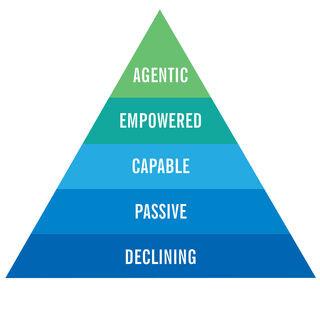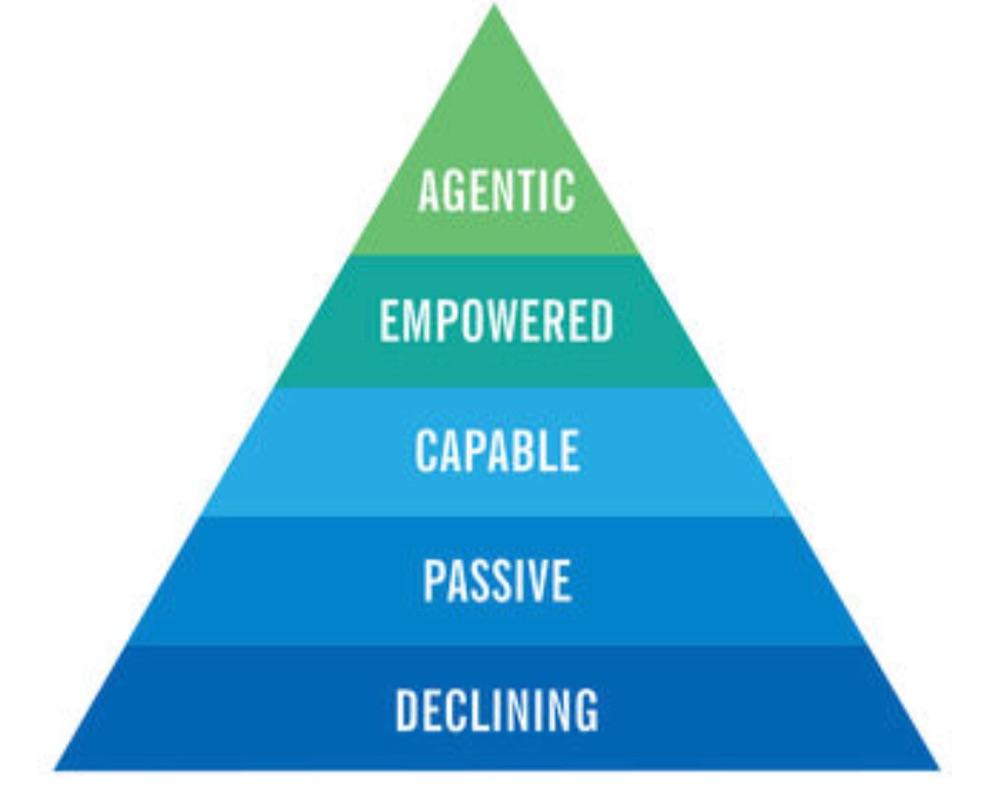Agency: The Highest Level of Personal Competence
Curated from: psychologytoday.com
Ideas, facts & insights covering these topics:
13 ideas
·3.07K reads
25
Explore the World's Best Ideas
Join today and uncover 100+ curated journeys from 50+ topics. Unlock access to our mobile app with extensive features.
Being Agentic
In the psychological sense, agency entails a category of beliefs, a mindset. More profoundly, genuine agency includes the strategies and actions that accomplish what we want and bring us what we need.
Feeling that we have agency is nice. But feeling agentic falls far short of exercising agency—thinking and behaving competently and making real progress toward our desired goals.
To exercise agency is to acquire significant control over our outcomes in life’s various arenas, including school, work, sports, physical health, and psychological well-being.
33
504 reads
Fully Fledged Agency - The 4 Pillars
Fully fledged agency requires believing we can achieve our goal and engaging in the following activities:
- Forethought: deciding to take on a challenge, thinking ahead, setting goals, and making plans.
- Implementation: taking first steps, enacting plans, and persisting toward success.
- Self-management: taking care of yourself, dealing with emotions and stress, and maintaining good health to sustain your efforts.
- Learning and adapting: monitoring progress, rethinking strategies and tactics, and making effective adjustments.
35
343 reads
Competence Mindsets
A mindset is a set of beliefs or assumptions—entrepreneurial, capitalist, global, environmental—that guide your perceptions, thoughts, and actions. Fortunately, a belief in one's competence and agency (the highest form of competence) can be learned and developed.
Two widely studied mindsets hold particular relevance to competence and agency. To have a fixed mindset is to believe that intelligence and other personal attributes and abilities are set in stone. In contrast, a growth mindset motivates and allows you to strengthen your competence through learning.
31
274 reads
The Most-Productive Mindset
An agentic mindset—believing that we have a realistic chance to succeed and can competently apply the four pillars of agency—is the most productive of various competence-related mindsets. These mindsets influence, for better or worse, job performance, careers, and even efforts to adapt to and reduce the rate and magnitude of climate change.
29
254 reads
A Hierarchy of Competence Mindsets
Fixed and growth mindsets can influence whether a person will move upward in the hierarchy of competence mindsets shown in the accompanying figure.
The figure above distinguishes 5 mindsets representing different levels of competence, arranged from weakest competence at the bottom to the most robust competence (agency) at the top.
30
248 reads
Moving Up And Down The Hierarchy Is, In Fact, Natural
Someone might feel strong agency in their job but be less sure about their long-term career and helpless about climate change.
We should always remember that beliefs and feelings can change, shifting and fluctuating over time and from challenge to challenge. Changing a mindset, whether due to new circumstances or personal choices, can move a person up or down the hierarchy.
A fixed mindset can suffice if we don't care about improving our competence in a particular area. If we choose to aim higher, we can do so by embracing a growth mindset.
29
205 reads
The 5 Levels Of Competence-Related Mindsets
- The Declining (or Decremental) Mindset: “My ability to perform is or soon will be slipping away.”
- The Passive Mindset: “I don’t think much about my competence in this domain and probably won’t try to improve.”
- The Capable Mindset: “I can perform adequately and improve if I put my mind to it.”
- The Empowered Mindset: “I have the skills and freedom to perform well and get even better.”
- The Agentic Mindset: “I have the skills and resources I need (or can obtain them), I feel motivated to apply them, and I am acting in ways that will accomplish what is needed.”
36
211 reads
The Declining (or Decremental) Mindset
“My ability to perform is or soon will be slipping away.”
Examples of declining (technically, decremenral) mindsets include believing that specific physical or mental abilities are declining and not expecting a turnaround, the same outlook regarding technical skills or energy levels helpful to our work, or believing climate change will get far worse no matter what we do so we needn't even try to help.
28
176 reads
The Passive Mindset
“I don’t think much about my competence in this domain and probably won’t try to improve.”
This can result from a fixed mindset and believing we have little chance of improving or not deeming improvement in that area to be necessary. We might have checked out of a previous activity or never checked in. Passivity can be overcome with higher-level mindsets plus practice, but low effort usually characterizes this mindset.
28
163 reads
The Capable Mindset
“I can perform adequately and improve if I put my mind to it.”
This mindset may or may not be grounded in reality. This indicates reasonable confidence but sometimes overconfidence. A capable mindset probably feels good but may not translate into high motivation and effective action if circumstances change. It can be a hindrance if we are performing inadequately or in the eyes of others but don’t know or believe that our performance isn't measuring up.
30
161 reads
The Empowered Mindset
“I have the skills and freedom to perform well and get even better.”
Being truly empowered is more than a feeling; it requires adequate autonomy, support, resources, and opportunities. Having these empowerment tools at our disposal is not the same as applying them effectively; that’s the engine of complete agency.
28
174 reads
The Agentic Mindset
”I have the skills and resources I need (or can obtain them), I feel motivated to apply them, and I am acting in ways that will accomplish what is needed.”
Full agency requires enacting all four agency pillars to accomplish your goals.
29
172 reads
Sometimes Changes Don’t Bring About Changes
A declining mindset may or may not be accurate. Sometimes turning around a decline isn’t possible. Or facts and circumstances can improve with concerted effort and practice. Changing your mindset doesn't magically bring about desired changes.
Still, a shift in mindset can prompt action—agency's engine—strengthening our mental or physical health, job performance, and career. It can even help prevent or reduce the worst effects of climate change.
31
186 reads
IDEAS CURATED BY
CURATOR'S NOTE
Human agency is a mindset plus a set of learnable actions that help us attain what we want in life. Whatever our “level”, we can hold steady, decline, or grow.
“
Similar ideas
5 ideas
The nature of mindsets
medium.com
5 ideas
6 ideas
5 Ways to develop Growth Mindset
everydaypower.com
Read & Learn
20x Faster
without
deepstash
with
deepstash
with
deepstash
Personalized microlearning
—
100+ Learning Journeys
—
Access to 200,000+ ideas
—
Access to the mobile app
—
Unlimited idea saving
—
—
Unlimited history
—
—
Unlimited listening to ideas
—
—
Downloading & offline access
—
—
Supercharge your mind with one idea per day
Enter your email and spend 1 minute every day to learn something new.
I agree to receive email updates

